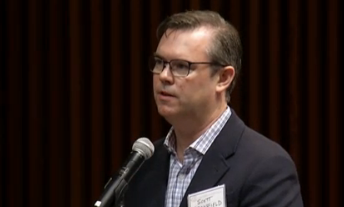Our friend and ACT member Scott Stanfield raised concerns about the expansion of first-sale doctrine at a roundtable discussion hosted by the PTO last week in Berkeley, CA. Scott is the CEO of the California-based company, Vertigo Software, which employs more than 60 people.
Foremost among the issues he raised is the unsustainability of an app marketplace where a “used” copy could sell for a tenth of the price of an identical new app. His remarks clearly explained the devastating impact this would have on app makers, which we’ve captured in the excerpts below:
I’m Scott Stanfield and I’m the CEO of a software company called Vertigo Software… We have about 60 employees working out of our Point Richmond office and in Portland as well – we build apps for big media companies like HBO, Showtime, new media companies Go Pro, we did the winter Olympics, March Madness…
We build these apps for our clients that run on your Windows phone, your iPhone, Android, desktop, Xbox, etc.So we have some experience in this – we’re hired to build this software but what’s really driving this new business in my space, and what allows me to hire more people, is the apps market.
This apps market didn’t exist six years ago. It was $60 billion in 2013 –
So here’s what I’m worried about. I’m worried about two potential consequences, as I’m trying to think how this plays out.
I’m working with a local book publisher who has a cocktail book called “901 Very Good Cocktails,” and I can attest to maybe 100 of them. They’re very good – and he literally drank and made 901 cocktails over the course of three years, three cocktails a night…copyright’s the least of his problems…
So we’ve worked with him… and I want to make his book digital because I can’t be flipping through a big book when I’m trying to make a cocktail for my friends. So we’re working on this now and this is how it’s going to work – we’re going to sell it on the app store for about 4 bucks; that’s where we’re thinking will support this market, and we’re going to have it released and ready to go in about two months along with iOS 8.
Okay, so now I’m thinking and fast-forwarding to a secondary market for reselling apps. And I see two really scary problems.
Number one, there is no distinction between used software and new software, especially with an app like this – almost by its definition, the used software, if you strip away the state, it’s identical.
If I want to sell my wallet, I’ll strip away the state – I’ll remove my driver’s license, my credit cards; all the things that are personally identifiable about me, things that are important for my privacy, I can get rid of and sell the wallet.
Now the wallet’s definitely not in new condition, and also my market will either be Craigslist or eBay – it’s not like I’m going to take it back to the store where I bought it and put it side-by-side with a new wallet. And if I did that, a customer would clearly know, that’s why the used one is cheaper – it’s been beat up and been in my back pocket for 10 years.
So there’s a distinction there that doesn’t exist in an app store. And, it scares me to death. Because, if I could sell 10,000 copies to cocktail enthusiasts, which is a polite way of putting the space that we’re working in – let’s say my total space is 10,000. If I sold all 10,000 on day one, I would be very happy. If I didn’t sell anymore, if I forecast 10,000 copies, I’d be fine.
But what’s more likely to happen, let’s say I sell 3,000 in the first month, 3,000 four months later and, 3,000 four months later, if those 3,000 people, if half of them don’t like it, they’ll put that app right next to mine in the app store, and I’ll get nothing. And I’ll lose all that future revenue.
Not only does Scott foresee a situation where app publishers would lose a massive amount of revenue due to a secondary app market – he is also concerned about managing user privacy and continued:
Let’s say I’m building an app and let’s say it’s a camera app…The camera app is very good but it also stores my images in the cloud. When I go to sell that app, I have to strip that state away – taking my ID and my wallet – I have to take those photos away before I go in to resell the application.
That’s going to create a big burden for me – not for the cocktail app because that’s maybe [collecting] your favorite cocktails, big deal, the consequences are small – but the consequences can be much greater if it’s up to me, the app publisher, to service the used copies from clients I’m no longer making revenue on [and am] now responsible for the previous owner’s privacy and their cloud storage or subscription.
To close, Scott pointed to his biggest fear concerning expansion of first-sale doctrine:
I’m…worried about the fact that it’s going to kill this innovation. It’s a really important market and it’s really driving a lot of the jobs in the tech sector – [not just] here in California, but across the US.
A link to the roundtable can be found here. Scott’s comments are from [02:59:00-03:05:00].
